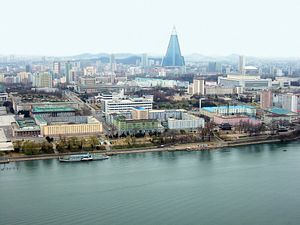The move by the United States to designate North Korea a “primary” money launderer leaves it more isolated from global finance than ever, barring financial institutions with U.S. accounts from doing business with the regime.
The Treasury Department announced Wednesday it would ban institutions from carrying out dollar transactions “for or on behalf of a North Korean banking institution.”
While American banks had already been prohibited from doing business with North Korean institutions, the new measures have the potential to scare foreign banks off from any dealings with Pyongyang. Banks in relatively regime-friendly countries such as China and Singapore would risk being cut off from the dollar, and even face prosecution, if they provided services to North Korean concerns.
In a press release on the Treasury’s website, Adam J. Szubin, acting under secretary for Terrorism and Financial Intelligence, said, “The regime is notoriously deceitful in its financial transactions in order to continue its illicit weapons programs and other destabilizing activities.”
While it’s unclear how much pain the banking rules could inflict on Pyongyang, which heavily relies on cash thanks to existing sanctions, some observers portrayed them as a game changer.
“This is, without question, the single most powerful sanction the United States has ever imposed on North Korea,” Joshua Stanton, a drafter of the recently-enacted North Korea Sanctions Enforcement Act, wrote on his blog One Free Korea.
Calling the developments the “death knell” for leader Kim Jong-un’s byungjin policy of developing the economy and nuclear weapons at the same time, Stanton said the regime would face “unprecedented” financial pressure.
“By cutting off his access to his sources of regime-sustaining hard currency, it denies him a viable, long-term strategy for financial survival unless he commits, irreversibly, to disarmament and reform,” he wrote.
Others were more cautious.
“This will make things more difficult, but North Koreans are already used to things being difficult,” Andray Abrahamian, associate director of research at Choson Exchange, told The Diplomat.
On Wednesday, his NGO, which teaches business skills inside North Korea, outlined the likely ways North Koreans would get around the rules.
“The smaller often regional banks that do deal with the DPRK, either don’t trade in dollars or help their Korean partners hide their transactions, for a price,” Abrahamian wrote on the Singapore-based NGO’s blog.
“Individuals may also do this, again, for a price. That price may now go up as the risk increases post-311 (the section of the Patriot Act invoked by the Treasury). Cash will become even more paramount in DPRK business-dealings. North Korean institutions will try to settle international transactions in RMB more.”
What’s certain is that China will be a key factor in how effective the changes are. While Beijing voted for UN sanctions in February that called on member states to cease dealings with North Korean banks, it has recently signaled a desire to reaffirm ties with its longtime ally, despite its exasperation with Pyongyang’s repeated nuclear and missile tests.
During a visit to China by the Workers’ Party of Korea Vice Chairman for International Affairs Ri Su-yong this week, Chinese President Xi Jinping emphasized the value of friendly ties between the countries.

































